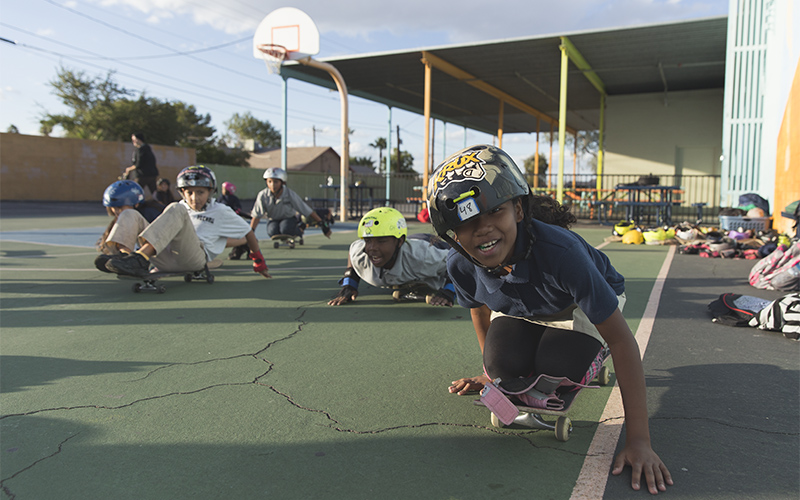
Students in the Skate After School program learn at their own pace and are encouraged to use whatever riding styles they find most fun. (Photo by Ryan Dent/Cronkite News)
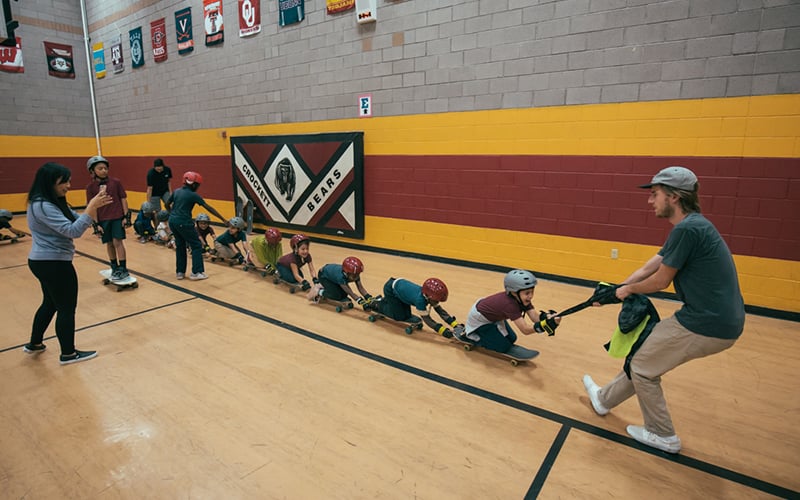
Volunteer Matthew Blevins pulls students on skateboards at David Crockett Elementary School in Phoenix. (Photo by Ryan Dent/Cronkite News)
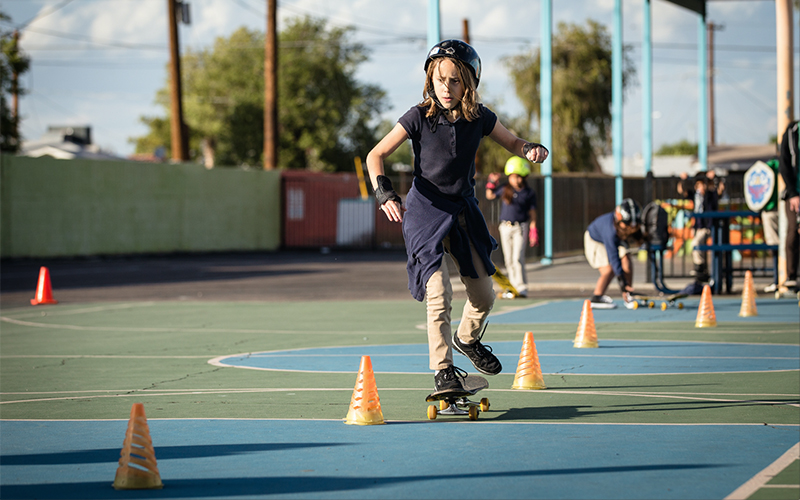
A student practices turning at Phoenix Collegiate Academy. (Photo by Ryan Dent/Cronkite News)
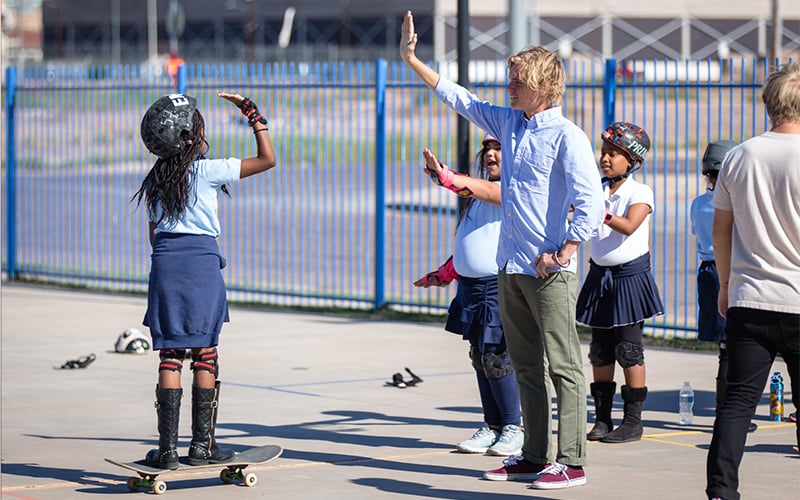
Corey Cavanaugh, a Skate After School volunteer, gives a student a high five at Vista College Preparatory in Phoenix. (Photo by Ryan Dent/Cronkite News)
PHOENIX – Rhama Majid raced into the gym at David Crockett Elementary School and found her favorite set of gear: pads, a helmet and a skateboard. She strapped on her protective equipment, put down her skateboard and pushed away like she’d done it a thousand times before.
Majid moved from Tanzania to the United States when she was four years old, and she is one of a handful of refugees who attend the Skate After School program held at David Crockett Elementary every Wednesday afternoon.
Majid is in her first year at Skate After School, a program run by a nonprofit organization that brings skateboards, protective gear and mentorship to hundreds of students in schools across the Valley. She didn’t have any experience with skateboarding before entering the program, but she has quickly grown to love it.
“I get to try something new, and even if you make a mistake you can still try again, and you can get better and better,” Majid said.
That resilience is especially important for students at Crockett Elementary. Principal Sean Hannafin said 100 percent of his students live below the poverty line, and many have parents who do not speak English.
There isn’t a lot of opportunity for outdoor activities near the school. The closest community center is two miles away, and the nearest public park is more than three miles away. To access these recreational opportunities students would have to pass under a freeway and cross busy intersections.
“The district as a whole only has one public park within the boundaries,” Hannafin said. “The school becomes the major hub for sporting, tutoring and community engagement events.”
Video by Ryan Dent/Cronkite News
Hannafin said the program provides a safe, active outlet for students.
“Skate After School shares the idea of how to persevere to accomplish goals they have set for themselves with mentorship, how to do it safely and how to encourage others,” Hannafin said.
He also said the positivity of the program reaches into the classroom.
“We have seen a continuation of increasing academics, attendance and behavior in the students that are involved in Skate After School,” said Hannafin. “Partially because they need to be a student first, and if they are not completing these tasks or showing improvement they are not able to participate.”
Skate After School was started in 2012 by three passionate skateboarders. Timothy Ward, Ryan Lay and Bobby Green bring the program to more than 500 students in eight schools each week in an effort to give students a safe haven that may not exist otherwise.
“I think it’s really special to the kids because the program feels unique and particular to them,” co-founder and professional skateboarder Ryan Lay said. “It gives them a group and a culture outside of traditional sports to identify with.”
David Crockett physical education teacher Joshua Meibos said he sees students involved in the program develop confidence in new ways.
“For example, you may have a student that’s not the strongest reader and he’s not the best soccer player, but they can come here to Skate After School for an hour and just shine,” he said. “It’s definitely bringing some big, positive reactions to the school and everyone involved….It definitely helps them know that they can feel confident about a skill, an activity or a hobby in a way they may not find in a normal school day.”
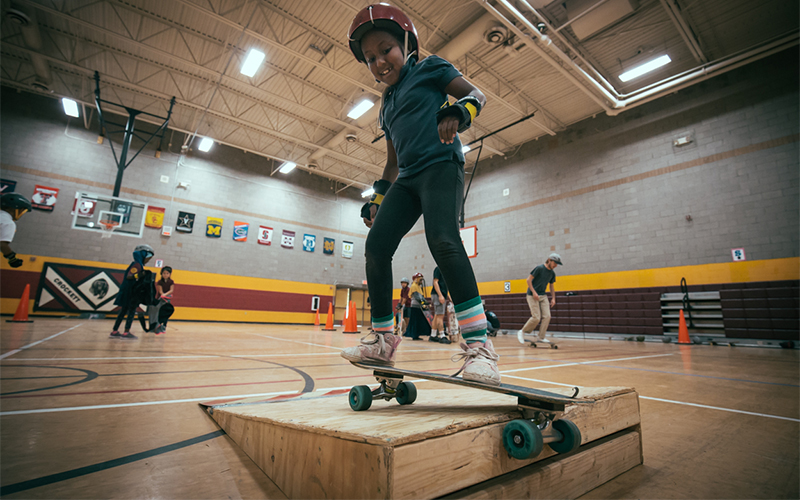
Ramps, rails and other obstacles are available to students who wish to further challenge themselves. (Photo by Ryan Dent/Cronkite News)
To supplement the growth of the program and the constant need for new equipment, Skate After School relies on donation bins in local skateboarding shops.
Because the program lives solely on product and financial donations made through crowdsourcing, volunteers are essential to keeping costs down and the organization operational.
“We feel honored that we’ve acquired such an outstanding team of not only ripping skaters, but such kind people,” Lay said.
The response from students, parents and faculty has exceeded expectations the founding trio set prior to launching the after-school program, Lay said.
Generosity, respect, innovation and persistence are at the forefront for what Skate After School founders said are essential to skateboarding. When paired with skateboarding, these four values are enough to encourage positive growth among participants, Ward said.
“Skateboarding fits this perfect niche between athleticism, creativity and personal growth,” said Ward. “It doesn’t take too much structure but is just entertaining enough to hold their attention and motivate the kids to progress.”
Still, Skate After School has had its difficulties.
“I would say a challenge for Skate After School is the fact that none of us have been able to dedicate our full selves to it,” Ward said. “Ryan with his professional skate career, Bobby operating his business and myself with school hasn’t really allowed us the opportunity to dive all the way in.”
Lay said there’s still a lot of work to do.
“We are always pushing to expand our reach and impact more people in the community that can benefit from our program,” Lay said. “There’s a tremendous amount of need in Arizona alone, so I think we’ve got our work cut out for us.”